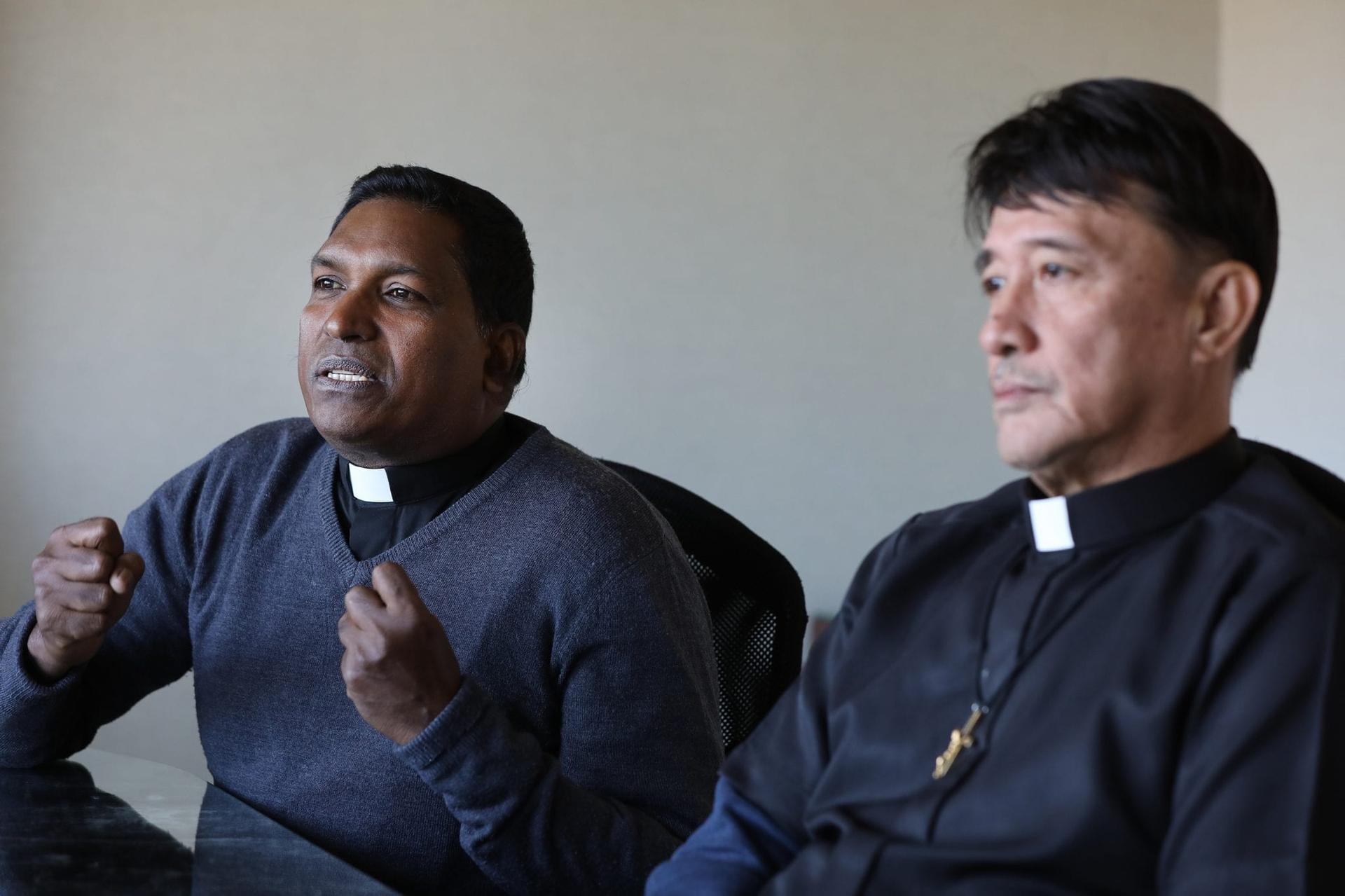NEW YORK — Despite rising extremism, two missionary priests in Southeast Asia believe that anti-Christian persecution has “strengthened the prophetic role of church.”
“We exercise our role as prophets in our time” in calling out abuses against Christians, said Monsignor Romeo Saniel, who serves as vicar administrator of Jolo in the Philippines and has participated in several peace negotiations between the Philippine government and militant Muslim factions.
Saniel and Father Neville Fernando of Sri Lanka, recently spoke with Crux about the threats Christians face in their respective countries — but also why they believe the Catholic Church is helping to lead the way in peacebuilding and interreligious dialogue.
Both were in New York to participate in “Listening to Survivors of Religious Freedom: The Call to Religious Freedom” panel at the United Nations and sponsored by the papal charity Aid to the Church in Need.
For Fernando, the challenges of combating extremists were cemented this year on Easter Sunday when he was one of the first responders to the brutal attacks across Sri Lanka targeting Christians and killing over 300 people and injuring some 500 others.
Fernando, who is a former Franciscan provincial, was standing outside of St. Sebastian’s Church in Negombo when he saw a man carrying what he described to a friend at the time as a “heavy bag.”
Moments after watching the man enter the church, he heard the fatal explosion. He recalls rushing into the church and seeing blood everywhere. As the victims rushed outside, many grabbed onto him for help, leaving him covered in blood, as well.
In the aftermath, he feared that the country — which has enjoyed relative peace since the end of its decades-long civil war in 2009 — would erupt in widespread violence between religious factions.
Yet Fernando said that the country’s Catholic bishops have been united in their efforts to keep the peace.
He told Crux that “we went house to house to say not to do harm to any Muslim neighbors. ‘They are your bothers and sisters,’ we said,” noting that they emphasized that Muslim extremists shouldn’t taint the entire religion.
Yet even with a focus on forgiveness, Fernando said that the country’s bishops, led by Sri Lankan Cardinal Malcolm Ranjith, have pushed for “justice and truth,” and an explanation for why certain government officials ignored warnings of possible attacks.
“We are not against politicians,” said Fernando. “But we want the truth.”
That search for truth as a necessary part of peacebuilding has been something that Saniel has pushed for in the Philippines, as well, where he’s been a key interlocutor between the government and the country’s Catholic and Muslim leaders.
Although the overwhelming majority of the country is Catholic, Saniel’s ministry is in an area where Christians constitute just three percent of the population.
In his 34 years as a priest, Saniel says that he continues to be motivated by the two things that drew him to the priesthood nearly four decades ago: Love for the Church and service to the poor.
Earlier this year, on January 27, jihadists bombed Our Lady of Mount Carmel Cathedral in Jolo, killing 22 people and wounding more than 100 others. Since then, he’s been responsible for helping the Christian community heal — but also reaching out to the Muslim community who have been targeted by Wahhabi extremists who he says are “not only attacking Christians but moderate Muslims who refuse to join them.”
Following those attacks, Saniel met with Pope Francis in Rome where the pope charged him with the mandate to “unite rather than divide,” and not to allow the attacks to interfere with the good relationships that the majority of the country’s Catholics and Muslims enjoy.
Saniel says he reflects back on Christ on the cross who asked forgiveness for those who “do not know what they have done.”
Earlier in his career as a priest, two Muslims approached Saniel while he was celebrating Mass. They put a gun to his head but when they pulled the trigger, the gun jammed and they fled in fear.
“The Lord saved me,” Saniel says of that experience, which has since led him to realize he had a “vocation to commit myself to interreligious dialogue and helping young Muslims in particular” — he adds that it’s come with the realization that “the people you serve may be the people who want to kill you.”
In response to these threats on his life — and the lives of other Christians — Saniel says he believes that the Church’s message that all life valuable is something that can aid interreligious dialogue for all people of goodwill.
“Maybe this is a time of purification and a time for the Church to exercise its prophetic voice in terms of protecting life, human rights and dignity,” Saniel told Crux.
Fernando agrees, saying that since the attacks last Easter, “faith is increased and the churches are full.”
In both the Philippines and Sri Lanka, both men believe that peacebuilding and reconciliation are essential — and that they find the perfect example in the witness of Jesus Christ who came to earth and lived among neighbors of all backgrounds and differences, yet worked toward unity.
“Fraternity and friendship is a must,” said Fernando, while adding that “differences are good and beautiful, too.”
Follow Christopher White on Twitter: @cwwhite212
Crux is dedicated to smart, wired and independent reporting on the Vatican and worldwide Catholic Church. That kind of reporting doesn’t come cheap, and we need your support. You can help Crux by giving a small amount monthly, or with a onetime gift. Please remember, Crux is a for-profit organization, so contributions are not tax-deductible.

















